Belarus: an unwanted friend of ‘Great China’?
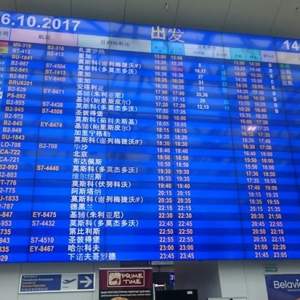
On 6-8 April, Chinese defence minister Wei Fenghe will visit Belarus. Wei’s combined visit to Russia and Belarus, his first foreign trip since taking up the post, demonstrates recognition that Minsk gives the highest priority to its partnership with Beijing.
The Belarusian authorities have chosen orientation towards Beijing as a fundamental dogma in foreign policy. Belarus pursues this policy despite contradictory effects of the alliance with China. The Belarusian government hopes that it will get a better place in the sun in a future world shaped by China. For the time being it tries to reap some smaller benefits from Beijing to restructure its industry, find new loans and rearm.
Minsk expects a brighter future
The current Belarusian government wants China to reshape the world. It supports Beijing in that regard. Addressing a Belt and Road Initiative forum in Beijing in May last year, the Belarusian president urged the participants of this new Chinese integration initiative for Eurasia to “change the model of interaction between states.” Belarus’s presidential administration announced that the Chinese initiative “forms international relations of a new kind.”
While at the forum Alexander Lukashenka spoke of “reshaping the world’s economic map,” in a subsequent meeting with Chinese leader he assured Xi Jinping that Belarus was willing to help China “defend peace throughout the world” too.
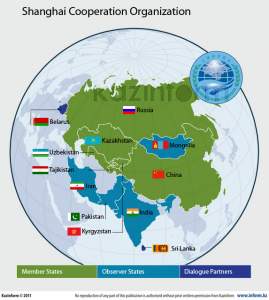
Image: Kazinform
Other Belarusian officials sound a similar note. For instance, at a December meeting of the Chinese-dominated Shanghai Cooperation Organisation, Belarus’s prime minister Andrei Kabyakou insisted that the member states of the organisation should create additional factors for world security and stability.
To underline his belief in China’s ascendancy, Lukashenka even made his youngest son, Mikalai, learn Chinese. A video with Mikalai congratulating the Chinese on New Year in Mandarin appeared on YouTube on 18 February.
Does Beijing notice?
How much do these pro-Chinese moves by Minsk impress Beijing? On the one hand, top-level Chinese officials regularly visit Belarus. Last year, six Chinese ministerial-level officials, as well as state and party administrators of three Chinese provinces, visited Belarus. Minsk negotiated with such major Chinese companies as Sinomach, China UnionPay and others.
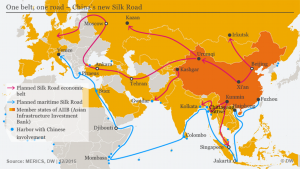
Belt and Road Initiative’s official routes and involved nations (in orange). Belarus marked grey. Map: DW.
On the other hand, even Belarus’s status in China’s global plans, such as the Belt and Road Initiative (BRI), remains unclear. Numerous Chinese and international publications do not include Belarus in the initiative.
The Belarusian president, responding to this problem, announced that the Great Stone Belarus-Chinese industrial park will be an instrument by which Minsk should participate in the BRI. For about three years now, the two countries have been constructing the industrial park which will provide the most favourable conditions for Chinese firms.
Belarusian officials emphasise that the park’s construction progresses more rapidly than scheduled, but by the end of December occupancy comprised only some two dozens firms. Moreover, top officials in Minsk, again and again, ask their Chinese partners to bring new technologies to the park voicing the reasonable concerns of Belarusian government which Lukashenka succinctly put thus: “We do not want just storage there.”
The hopeless trade situation
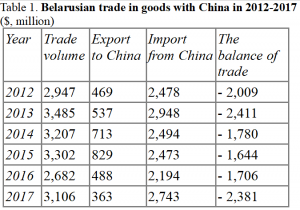 To make things worse, since the mid-2000s Minsk suffers from a huge and increasing trade deficit with China. It dramatically grew again in 2017 (see Table 1).
To make things worse, since the mid-2000s Minsk suffers from a huge and increasing trade deficit with China. It dramatically grew again in 2017 (see Table 1).
Even the planned indicators of export growth for China for 2017-2020, adopted by the government last year, demonstrate Minsk’s lack of hope that it can significantly reduce the deficit anytime soon. After keeping silent for years, Belarusian officials started raising that issue with every visiting Chinese counterpart from 2016 onwards.
Beijing responded in several ways. First, it offered Minsk assistance, for instance in the form of unspecified “technical economic aid” to build housing for socially vulnerable groups. It shared defence technologies and sent armoured vehicles as a gift to Belarusian military, with the last instalment arriving in January.
Secondly, it opened its markets for Belarusian food exports: in 2016 – for dairy, in 2017 – for meat. The absolute figures of such export last year – about $10m – fail to impress if compared to Belarusian food exports to its main market in Russia which made up $2.1bn. The government, however, celebrated this achievement as a promising start.
On 28 December, the head of Vitsebsk province Mikalay Sharstnyou in a commentary for Belarus Segodnya, a media outlet of the presidential administration, said that the Chinese market should relieve the national agriculture and food industry which regularly faces closure of Russian markets. He added that in 2018 some dairy factories in Vitsebsk province would be adapted to meet Chinese standards.
Chinese industrialisation
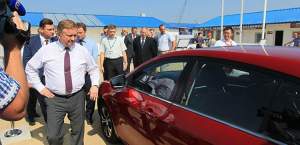
PM Kabyakou visiting BELGEE. Image: adt.by
Meanwhile, Minsk wishes to reshape national industry with Beijing’s help and pulls out all the stops to that end. On 18 March, TUT.by, an internet media outlet, revealed that Belarusian deputy minister of industry, Hienadz’ Svidzerski, has been appointed to run the joint Belarus-Chinese car manufacturing factory BELGEE. Apparently, he had not resigned from his office at the ministry, and so the appointment represented an extraordinary gesture of support for the project. The factory started operation last November and will produce 60,000 cars annually.
Observers see several positive results of Belarus-Chinese industrial cooperation. Last December, the Chinese САМСЕ corporation completed a cellulose factory in Svietlahorsk. By January, another major Chinese company Zoomlion launched serial production of construction and special vehicles in Mahilyou. At the same time, this company organises the manufacture of tower cranes at the bankrupted Strommashyna factory nearby. Another Belarusian firm, Amkador, received a Chinese loan of $192m to construct its new factory.
On 20 February, Belarusian state media reported a programme aimed at the industrialisation of Belarusian regions. The programme intends to set up more than a hundred enterprises throughout the country by 2025. The Belarusian ministry for industry hopes that China will become a major source of support for the programme.
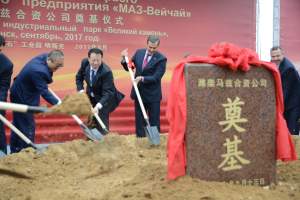
Beginning of the construction of an engines producing factory, a Belarus-Chinese joint venture. Image: MAZ.
Belarusian media usually fail to discuss the contradictions inherent in Chinese involvement. For instance, they wrote about Minsk Motor Works (MAZ) constructing an engines plant together with the major Chinese Weichai corporation. They ignored the fact that it creates competition for MAZ which has produced engines in Belarus for many decades. Likewise, no discussions followed when last November the Chinese Midea corporation announced its plans to launch production of home appliances, which will compete with the Belarusian firm Atlant.
Only recently has some criticism appeared. In January, Narodnaya Gazeta and Respublika, government-affiliated dailies, published articles criticising the BELGEE automobile production project and the Chinese Zongshen corporation’s plans to acquire Homselmash, the Belarusian machinery manufacturer.
Belarusian officials maintain a sycophantic line in dealing with China, with Lukashenka setting the example by praising “Great China.” Yet Minsk has started demonstrating more pragmaticism regarding its Chinese partners. Belarus now asks for and gets some rewards for its Sinophile policies and the losses it suffers because of them. The projects with Chinese involvement are not considered immune to criticism anymore. That detail makes future Belarusian cooperation with China less idealised, and instead more responsible and efficient.






